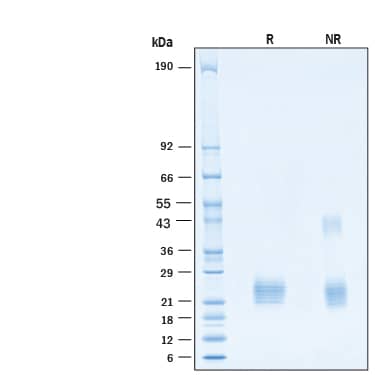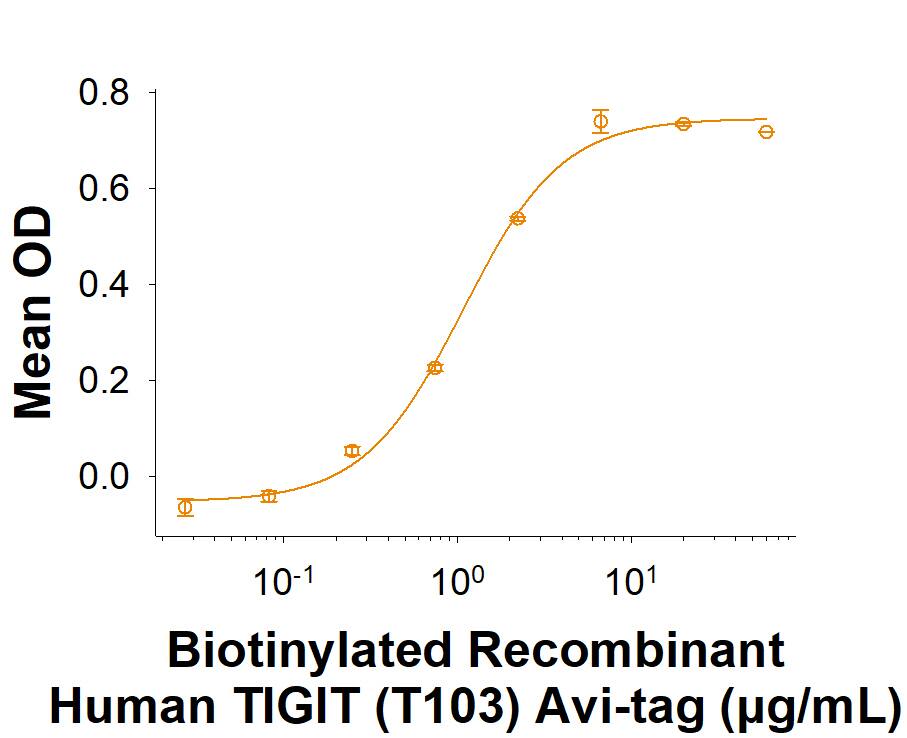Recombinant Human TIGIT (T103) His-tag Avi-tag Protein, CF
R&D Systems, part of Bio-Techne | Catalog # AVI11124
Biotinylated

Key Product Details
Learn more about Avi-tag Biotinylated Proteins
Source
CHO
Accession #
Structure / Form
Biotinylated via Avi-tag
Conjugate
Biotin
Applications
Bioactivity
Product Specifications
Source
Chinese Hamster Ovary cell line, CHO-derived human TIGIT protein
| Human TIGIT (Met22-Gln139, T103) Accession # Q495A1.1 |
6-His tag | Avi-tag |
| N-terminus | C-terminus |
Purity
>95%, by SDS-PAGE visualized with Silver Staining and quantitative densitometry by Coomassie® Blue Staining.
Endotoxin Level
<0.10 EU per 1 μg of the protein by the LAL method.
N-terminal Sequence Analysis
Met22
Predicted Molecular Mass
21 kDa
SDS-PAGE
18-29 kDa, under reducing conditions.
Activity
Measured by its binding ability in a functional ELISA.
When Recombinant Human CD155/PVR His Protein (Catalog # 2530-CD) is immobilized at 10.0 µg/mL (100 µL/well), the concentration of Biotinylated Recombinant Human TIGIT His Chimera Avi-tag (Catalog # AVI11124) that produces 50% of the optimal binding response is 0.500-5.00 μg/mL.
When Recombinant Human CD155/PVR His Protein (Catalog # 2530-CD) is immobilized at 10.0 µg/mL (100 µL/well), the concentration of Biotinylated Recombinant Human TIGIT His Chimera Avi-tag (Catalog # AVI11124) that produces 50% of the optimal binding response is 0.500-5.00 μg/mL.
Scientific Data Images for Recombinant Human TIGIT (T103) His-tag Avi-tag Protein, CF
Biotinylated Recombinant Human TIGIT (T103) His-tag Avi-tag Protein Binding Activity
When Recombinant Human CD155/PVR His Protein (2530-CD) is immobilized at 10.0 µg/mL (100 µL/well), the concentration of Biotinylated Recombinant Human TIGIT His Chimera Avi-tag Protein (Catalog # AVI11124) that produces 50% of the optimal binding response is 0.500-5.00 μg/mL.Biotinylated Recombinant Human TIGIT (T103) His-tag Avi-tag Protein SDS-PAGE
2 μg/lane of Biotinylated Recombinant Human TIGIT (T103) His-tag Avi-tag Protein (Catalog # AVI11124) was resolved with SDS-PAGE under reducing (R) and non-reducing (NR) conditions and visualized by Coomassie® Blue staining, showing bands at 18-29 kDa.Formulation, Preparation and Storage
AVI11124
| Formulation | Lyophilized from a 0.2 μm filtered solution in PBS with Trehalose. |
| Reconstitution | Reconstitute at 200 μg/mL in PBS. |
| Shipping | The product is shipped at ambient temperature. Upon receipt, store it immediately at the temperature recommended below. |
| Stability & Storage | Use a manual defrost freezer and avoid repeated freeze-thaw cycles.
|
Background: TIGIT
References
- Boles, K.S. et al. (2009) Eur. J. Immunol. 39:695.
- Yu, X. et al. (2009) Nat. Immunol. 10:48.
- Levin, S.D. et al. (2011) Eur. J. Immunol. 41:902.
- Xu, Z. et al. (2010) Cell. Mol. Immunol. 7:11.
- SwissProt Accession # Q495A1.
- Seth, S. et al. (2009) Eur. J. Immunol. 39:3160.
- Stanietsky, N. et al. (2009) Proc. Natl. Acad. Sci. USA 106:17858.
- Joller, N. et al. (2011) J. Immunol. 83:1338.
Long Name
T Cell Immunoreceptor with Ig and ITIM Domains
Alternate Names
VSIG9, VSTM3, WUCAM
Gene Symbol
TIGIT
UniProt
Additional TIGIT Products
Product Documents for Recombinant Human TIGIT (T103) His-tag Avi-tag Protein, CF
Product Specific Notices for Recombinant Human TIGIT (T103) His-tag Avi-tag Protein, CF
For research use only
